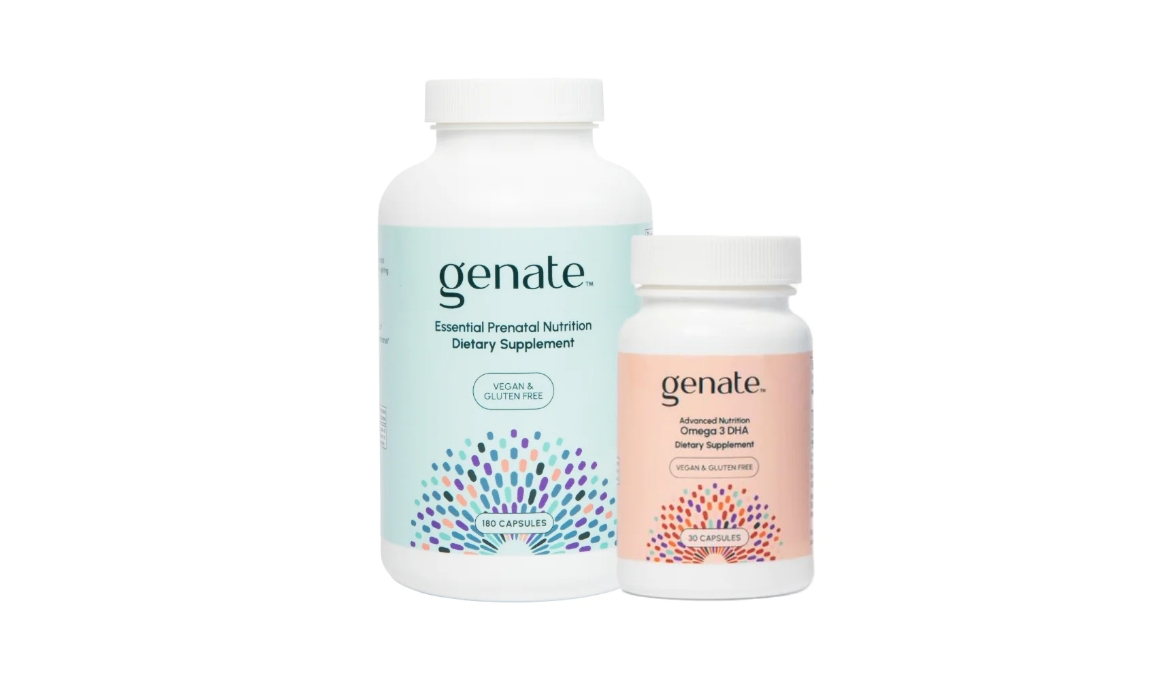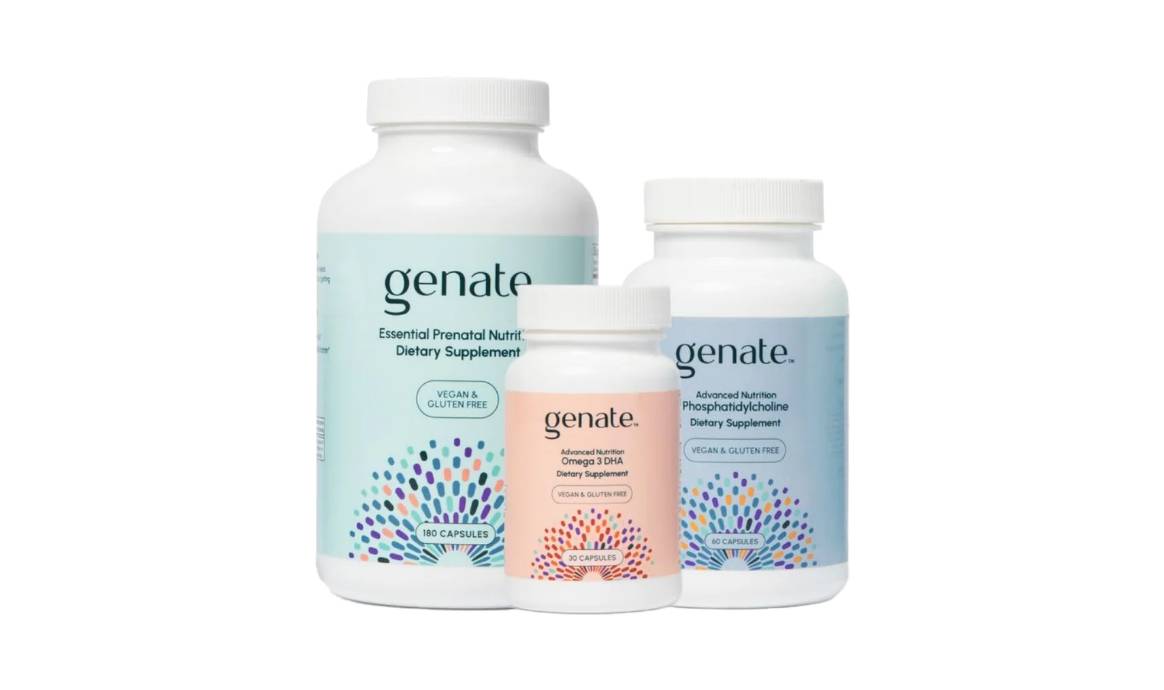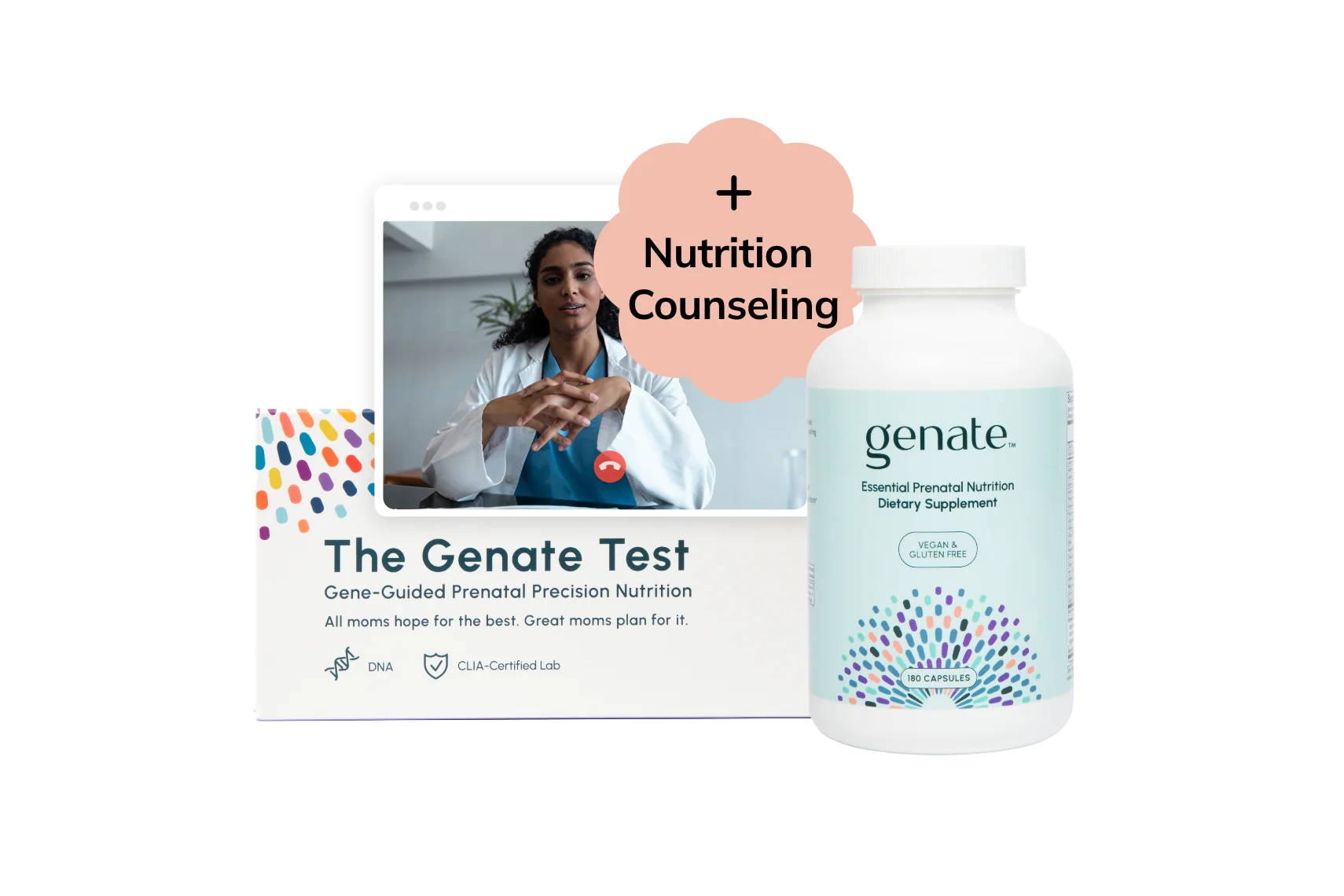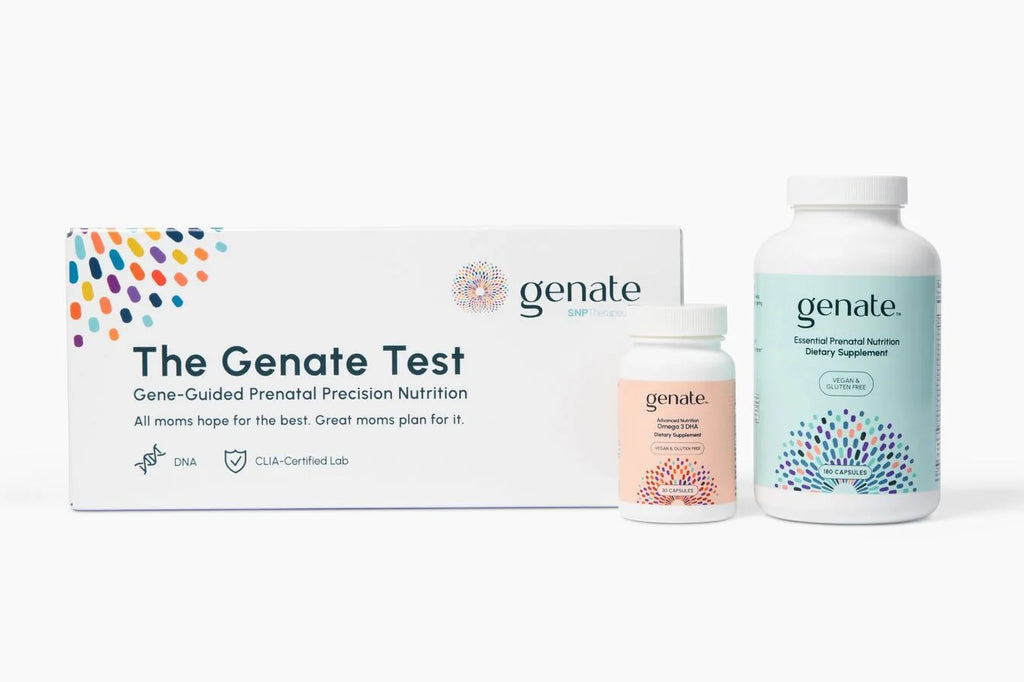Good nutrition is essential for every stage of your baby’s growth and development. But the efficiency with which your body metabolizes nutrients is partly determined by your genes, and common genetic variants can affect the metabolism of one-carbon nutrients that are critical for the development of your child’s brain and spinal cord. Genate Essential Prenatal Nutrition is a multivitamin formulated from academic research that provides women with a formulation optimized to support their baby’s cognitive development. It includes the one-carbon nutrients choline, betaine, methylfolate, and B vitamins that many women have trouble metabolizing and/or don’t get enough of in their diet.

DIET & NUTRITION
Registered Dietitian vs. Nutritionist: What’s the Difference?
by Libby Pellegrini, MMS, PA-C • January 3, 2024 • 5 minute read
You may have heard the terms "registered dietitian" and "nutritionist" used interchangeably. However, there are notable differences between the two titles and their scopes of practice.
If you’ve ever considered talking to a professional about your nutrition and how it impacts your health, you may have looked into dietitians or nutritionists in your area. However, you may not have realized that these nutrition professionals have distinct characteristics—they aren’t actually one and the same. (1)
For certain situations, you may benefit most from the services of a dietitian. For others, a nutritionist may be qualified to help. Read on to learn everything you need to know about the differences between a registered dietitian and a nutritionist.
Do Nutritionists and Dietitians Have Different Degrees?
Yes. One of the biggest differences between a nutritionist and a registered dietitian is the difference in their education. To summarize: registered dietitians must hold a graduate degree, complete a clinical internship, pass a national credentialing exam, and hold a license in each state where they practice. In contrast, many states do not require nutritionists to have a specific educational background or licensing requirements.
A registered dietitian must earn a graduate degree from a program accredited by the Accreditation Council for Education in Nutrition and Dietetics (ACEND).
Only certain programs meet the requirements set forth by ACEND, and dietitians must have exposure to courses like anatomy, biochemistry, and life cycle nutrition. An ACEND-accredited dietetic internship is also required, and dietitians must pass the national Commission on Dietetic Registration (CDR) exam to obtain registration to practice. After fulfilling these requirements, a registered dietitian will earn the Registered Dietitian (RD) or Registered Dietitian Nutritionist (RDN) credential.
To be clear: RD and RDN are both terms for registered dietitians. A nutritionist isn’t the same as a registered dietitian nutritionist (RDN).
To maintain their registration, RDs and RDNs must complete a minimum of 75 continuing education hours every five years.
A nutritionist is a broader term that refers to professionals who may come from a variety of different educational backgrounds. Unlike dietitians, nutritionists are not required to complete an internship, pass a national exam, or hold a state license to practice.
Often, they will have an educational background informed by similar coursework as a dietitian, but it is not mandated. Use of the term nutritionist is also not regulated by any governing body as the term dietitian is.
Nutritionists can earn advanced credentials, such as a Certified Nutrition Specialist (CNS), which is conferred by the Board of Certification for Nutrition Specialists (BCNS). A CNS title distinguishes a nutritionist as having a health-related degree (Master’s or above) and applicable experience as well as having passed a certification exam. However, this is not necessary for all nutritionists.
Pros and Cons of Dietitians and Nutritionists
If you’re unsure about whether to use the services of a nutritionist or a registered dietitian, it helps to compare the two.
Working With a Registered Dietitian
Pros:
- Standardization: Working with a dietitian ensures you have absolute confidence in your provider’s professional journey, credentials, and educational background.
- Care in a medical setting: If you need care for a medical condition, a life stage such as pregnancy, or special dietary needs, you’re most likely to work with registered dietitians because of their medical expertise. At SNP Therapeutics, for example, a team of registered dietitians provides personalized nutritional counseling based on genetic insights from the Genate Test.
Cons:
- Cost: When it comes to a dietitian vs. nutritionist salary, dietitians tend to be compensated at a higher rate. This means your costs as a client could be higher, too. However, services from registered dietitians may be completely or partially covered by health insurance, such as Medicaid or Medicare. (2)
Working With a Nutritionist
Pros:
- Broader scope: If you’re looking for someone to implement a nutrition program for your company, nutritionists may be a good choice. For example, their diverse educational backgrounds might include business or marketing skills.
- Cost: Working with a nutritionist for a specific health goal (like building muscle at the gym) may not be as costly as working with a registered dietitian.
Cons:
- Less medical expertise: Nutritionists may not be experienced or even legally able to address a nutrition concern related to a medical condition, because this is not part of their training.
When Should I Choose a Registered Dietitian or a Nutritionist?
When choosing between a registered dietitian and a nutritionist, evaluating your goals in seeking care is important. For example, if you would like someone to evaluate your eating patterns because you’d like to eat ”cleaner”, you could consult either a dietitian or a nutritionist.
However, if you're pregnant, have just been diagnosed with gestational diabetes, and need to have someone evaluate your diet and create a nutrition plan to keep your blood sugar under control, you need to see a registered dietitian. Whether you’re looking for advice about first-trimester diets or food allergies, a registered dietician is the medical professional you should turn to first.
Another important consideration is cost. Seeing a registered dietitian for medical issues is often covered by insurance, but consultations with a nutritionist are not.
Do Registered Dietitians Continue Their Education?
Yes, registered dietitians must earn continuing education credits to maintain their status. Continuing education ensures they stay updated on the latest research, trends, and advancements in the field of nutrition and dietetics.
Many RDNs attend workshops, seminars, and conferences and pursue additional certifications or training to enhance their skills and knowledge.
The Bottom Line
The differences between nutritionists and dietitians could impact which professional you select. Registered dietitian vs. nutritionist care may also depend on your individual scenario. If you have specialized dietary needs or a medical condition, it's best to consult a registered dietitian for nutrition care.
Having full confidence in your care team can give you peace of mind and help you make the best choices possible for your health.
At Genate, our team of registered dietitians specializes in supporting expecting moms with genetic nutrition counseling. To learn more about optimizing your nutrition during pregnancy, check out the Precision-Nutrition Package from SNP Therapeutics.
This article is not intended as medical advice to treat or diagnose any health condition but rather as educational health information for the general public. It should not be used as a substitute for individualized medical care from your healthcare provider.
Shop the Article
Save 23% today!
Genate Essential Prenatal Multivitamin + Advanced Omega-3 DHA Package
Bundle to increase savings and provide the foundational nutrients needed for optimal health and development.
From $72 per month
Save 23% today!
Comprehensive Prenatal Support Package
Genate Essential Prenatal Multivitamin + Advanced Omega-3 DHA + Phosphatidylcholine
Our most comprehensive bundle - you’ll receive our Essential Prenatal Multivitamin, Advanced Phosphatidylcholine, and Advanced Omega-3 DHA.
From $110 per month
Save 30% today!
Comprehensive Prenatal Nutrition Bundle
Buy the Genate Test and a nutrition counseling session with a Genate registered dietitian, and receive a 30-day supply of the Genate Essential Prenatal Multivitamin FREE. Purchase includes a 90-day prenatal multivitamin subscription at our best monthly price.
$309

Libby Pellegrini, MMS, PA-C
Libby Pellegrini, MMS, PA-C, is a professionally trained journalist and physician assistant. She has worked in numerous healthcare settings, including the rural United States, an inner-city Level I trauma center, and several suburban acute care centers. It was during her time at a functional medicine clinic in Southeast Asia that she developed an interest in the role of SNPs in personalized genetic evaluation and discovered how gene-guided nutritional counseling can enhance individual health outcomes.
Libby graduated Magna Cum Laude from Northwestern’s Medill School of Journalism, and her medical writing has appeared in a number of outlets, including WebMD, RxSaver, KevinMD, NPHIC, and Men’s Health.
Website: https://libbypellegrini.com/
LinkedIn: https://www.linkedin.com/in/libby-pellegrini-pa-c/
References
- Registered dietitian vs nutritionist – unraveling what’s the difference. NutritionEd.org. https://www.nutritioned.org/dietitian-vs-nutritionist/. Accessed September 24, 2023.
- Medical nutrition therapy services. Medicare.gov. https://www.medicare.gov/coverage/medical-nutrition-therapy-services Accessed October 15, 2023.
Take the Genate Quiz
Take our Nutrition Quiz to learn more about your nutrition journey.
Read Our Latest Articles
Frequently Asked Questions
What are the benefits of my baby getting the proper nutrients?
What are one-carbon nutrients and fatty acids, and why are they important?
One-carbon nutrients and fatty acids are critical for brain and spinal cord development during pregnancy and through the first two years of life. Although all nutrients are important, the one-carbon nutrients choline, folate, betaine, and B vitamins, along with the omega-3 fat DHA, provide the building blocks for proper growth of your developing baby's brain. Research at Cornell and Harvard universities has shown cognitive benefits for children born to mothers who received increased levels of one-carbon nutrients during pregnancy, demonstrating that optimal nutrition during pregnancy can have lasting effects for your baby.
If I buy Genate nutrition supplements, do I still need to take the test?
Genetic testing is a personal choice, and only you can decide what’s best for you and your baby. But the Genate Test is a powerful tool for optimizing your nutrition status, as it identifies genetically-caused metabolic inefficiencies that may influence your body’ ability to make and use the nutrients critical for your baby’s cognitive development. If you have SNPs in any of the nutrient pathways tested, your Genate Report will provide personalized recommendations for optimizing your nutrition. Our registered dietitians can show you how to fill in the gaps with foods and supplementation, if needed, to make sure you’re getting the nutrition you and your baby need.








